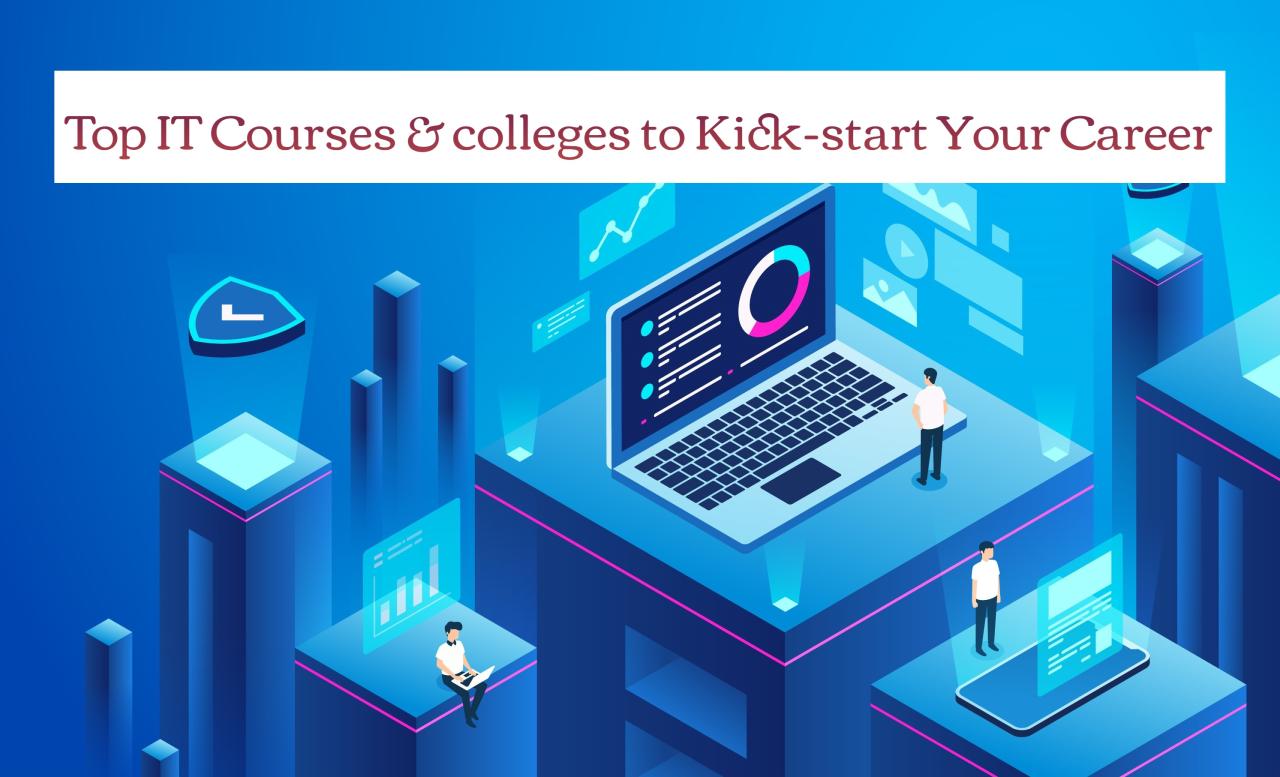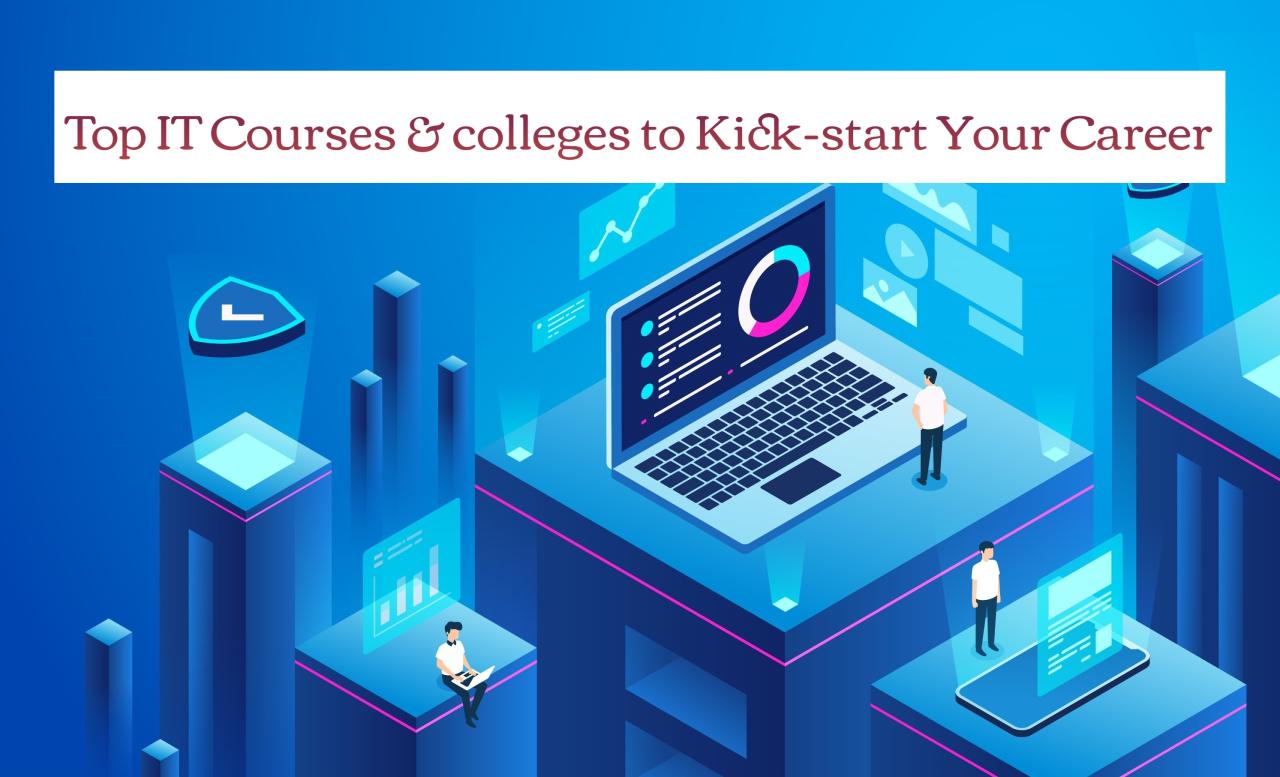Top-rated IT courses for beginners with career guidance offer a fantastic pathway into a booming tech industry. With the digital world expanding rapidly, skilled IT professionals are in high demand, creating exciting career opportunities for those willing to learn. This guide explores the best courses, helping you choose the right path to a rewarding IT career, covering everything from curriculum comparisons to job search strategies.
We’ll delve into what makes a course “top-rated,” examining factors like curriculum quality, instructor experience, student reviews, and, crucially, the career support offered. We’ll also compare popular courses across different specializations like cybersecurity, web development, and data analysis, highlighting the essential skills and knowledge you’ll gain. Finally, we’ll equip you with the resources and advice you need to land your dream IT job.
Introduction to Top-Rated IT Courses for Beginners
The IT industry is booming, experiencing unprecedented growth fueled by technological advancements and increasing digitalization across all sectors. This surge in demand has created a wealth of exciting career opportunities for skilled IT professionals, making it an attractive field for beginners looking to launch successful careers.
Statistics consistently highlight the robust job market. For instance, the U.S. Bureau of Labor Statistics projects significant growth in various IT occupations over the next decade, with some roles experiencing double-digit percentage increases. Globally, similar trends are observed, indicating a consistently high demand for individuals with IT skills. This high demand translates to competitive salaries and excellent benefits packages.
Pursuing IT training offers numerous benefits for beginners. It provides a pathway to high-paying jobs, fostering career advancement and personal growth. The skills acquired are highly transferable and relevant across various industries, making graduates versatile and adaptable to evolving market needs. Furthermore, IT training often cultivates problem-solving, critical thinking, and creativity – skills valuable in any profession.
Looking for top-rated IT courses for beginners that actually help you land a job? Many great programs offer career guidance alongside their curriculum, helping you build a strong foundation and a successful career path. Need a break from studying? Check out this exciting game: Tune In: Virginia Tech vs. Minnesota , then get back to mastering those coding skills! Remember, consistent effort in your studies will pay off big time in the IT field.
Choosing the right introductory IT course is crucial for maximizing career prospects. A well-structured course provides a solid foundation, equipping beginners with the necessary skills and knowledge to confidently enter the IT job market. The selection process should consider factors like curriculum quality, instructor experience, student reviews, and career support services.
Identifying Top-Rated Courses: Criteria and Selection

Selecting the ideal IT course involves careful consideration of several key factors. The curriculum should be comprehensive and up-to-date, covering essential concepts and practical applications. Instructor experience and teaching style play a significant role in learning effectiveness; experienced instructors with proven success in guiding beginners are highly desirable. Student reviews offer valuable insights into the course quality and learning experience.
Finally, robust career support, including resume building workshops, interview preparation, and networking opportunities, significantly increases job placement success.
So you’re thinking about cracking the IT world? Top-rated beginner courses with career guidance can really set you up for success. Many focus on in-demand skills like full-stack development, which leads to awesome freelance gigs. Check out this resource on full stack developer freelance opportunities and rates to get a feel for the market. Ultimately, the right IT course will help you land those sweet freelance jobs and build a rewarding career.
| Course Name | Strengths | Weaknesses | Specialization |
|---|---|---|---|
| Google IT Support Professional Certificate | Comprehensive curriculum, industry recognition, strong career support | Requires self-discipline, limited hands-on lab experience compared to some others | IT Support |
| Coursera’s Web Development Specialization | Focus on practical skills, projects-based learning, reputable platform | Can be challenging for absolute beginners, requires some prior programming knowledge | Web Development |
| Cybrary’s Cybersecurity Fundamentals | Wide range of cybersecurity topics, engaging learning format, affordable | May require supplementary resources for deeper understanding, certification not always included | Cybersecurity |
| DataCamp’s Data Analyst with R | Focus on data analysis tools, hands-on projects, strong community support | Requires some mathematical background, R programming can have a steep learning curve | Data Analysis |
Accreditation and industry recognition are vital for IT certifications. Accredited courses ensure quality and adherence to industry standards, increasing the value and credibility of earned certifications. Industry-recognized certifications demonstrate competence and proficiency, making graduates more competitive in the job market.
Reputable online learning platforms offering high-quality IT courses include Coursera, edX, Udacity, Udemy, and FutureLearn. These platforms offer a wide range of courses from leading universities and industry experts.
Course Content and Curriculum Analysis
Introductory IT courses across different specializations share some commonalities while also focusing on unique skill sets. Cybersecurity courses emphasize security principles, network security, and ethical hacking. Web development courses cover HTML, CSS, JavaScript, and often delve into backend technologies like Python or Node.js. Data analysis courses focus on data manipulation, statistical analysis, data visualization, and often utilize tools like R or Python.
Essential skills and knowledge covered in top-rated beginner IT courses include fundamental programming concepts, operating systems, networking basics, database management, and problem-solving techniques. Practical projects and assignments reinforce theoretical learning, allowing students to apply their skills to real-world scenarios. For example, a cybersecurity course might involve penetration testing simulations, a web development course might include building a portfolio website, and a data analysis course might involve analyzing a real-world dataset.
- Cybersecurity: Network security basics, ethical hacking principles, security protocols, risk management, incident response.
- Web Development: HTML, CSS, JavaScript, front-end frameworks (e.g., React, Angular), back-end technologies (e.g., Node.js, Python), database management.
- Data Analysis: Data cleaning and manipulation, statistical analysis, data visualization, data mining techniques, programming languages (e.g., R, Python).
Career Guidance and Job Prospects
Top-rated IT courses effectively prepare students for entry-level IT roles by providing practical skills training, industry-recognized certifications, and career support services. Graduates are equipped to handle real-world challenges and demonstrate proficiency in their chosen specialization.
Entry-level IT jobs beginners can pursue include help desk technician, junior web developer, data entry clerk, cybersecurity analyst, and network administrator. These roles provide valuable experience and a stepping stone to more advanced positions.
Many top-rated courses offer comprehensive career support, including resume building workshops, mock interviews, and networking opportunities with industry professionals. These services significantly enhance job search success rates.
Salary expectations for entry-level IT positions vary depending on specialization, location, and experience. However, entry-level salaries are generally competitive and offer significant earning potential for career growth. For example, a junior web developer might earn between $50,000 and $70,000 annually, while a help desk technician might earn between $40,000 and $60,000.
Essential Skills for Success in IT

Beyond technical skills, soft skills are crucial for success in the IT industry. Effective communication, teamwork, problem-solving, and adaptability are essential for collaboration, project management, and navigating complex challenges. Continuous learning and professional development are vital for staying ahead in the rapidly evolving IT landscape.
Building a strong professional network is essential for career advancement. Networking events, online communities, and professional organizations provide opportunities to connect with peers, mentors, and potential employers.
A compelling resume and cover letter are crucial for landing interviews. These documents should highlight relevant skills, experience, and accomplishments, tailored to the specific job requirements. Using s relevant to the job description increases the chances of applicant tracking system (ATS) filtering.
Illustrative Examples of Successful IT Careers
Many successful IT professionals began their journeys with beginner-level courses. These courses provided the foundation for further learning and career advancement. For example, a graduate of a web development bootcamp might progress to become a senior developer, architect, or even start their own company. Similarly, a cybersecurity graduate might become a penetration tester, security engineer, or a chief information security officer (CISO).
Different IT specializations lead to diverse and rewarding careers. For instance, a data analyst might work in various fields, from finance and marketing to healthcare and scientific research. A network administrator might work in large corporations, managing complex networks, while a help desk technician might provide technical support to end-users.
| Career Path | Required Skills | Average Salary Range (USD) | Specialization |
|---|---|---|---|
| Software Engineer | Programming languages (e.g., Java, Python, C++), software design principles, problem-solving | $80,000 – $150,000+ | Software Development |
| Data Scientist | Statistical analysis, machine learning, data visualization, programming (Python, R) | $90,000 – $180,000+ | Data Science |
| Cybersecurity Analyst | Network security, ethical hacking, security protocols, incident response | $70,000 – $140,000+ | Cybersecurity |
| Web Developer | HTML, CSS, JavaScript, front-end and back-end frameworks | $60,000 – $120,000+ | Web Development |
Resources and organizations like professional associations (e.g., ACM, IEEE), career services at universities, and online mentorship platforms provide career guidance and mentorship for aspiring IT professionals.
Conclusive Thoughts

Launching a successful IT career starts with choosing the right training. By carefully considering the factors discussed – curriculum, instructor expertise, career support, and your own interests – you can select a top-rated course that aligns with your goals. Remember, continuous learning is key in this dynamic field. Embrace the challenges, build your network, and watch your IT career flourish.
Looking for top-rated IT courses for beginners with career guidance? It’s a smart move, especially considering the global tech landscape. For instance, check out the manufacturing might discussed in this article, China is the manufacturing superpower | Hacker News , which highlights the growing demand for skilled professionals. So, finding the right IT course can really boost your career prospects in this dynamic environment.
The demand is there; now it’s time to seize the opportunity.
FAQ Guide: Top-rated IT Courses For Beginners With Career Guidance
What if I have no prior IT experience?
Many top-rated courses are designed for absolute beginners, requiring no prior knowledge. They start with the fundamentals and gradually build your skills.
How long do these courses typically take to complete?
Course durations vary, ranging from a few weeks for shorter, focused programs to several months for more comprehensive ones.
Are there financing options available for these courses?
Some platforms offer payment plans, while others may have scholarships or financial aid opportunities. Check individual course details.
What kind of job support can I expect?
Top-rated courses often include resume building workshops, mock interviews, and networking events to help you transition into the job market.
